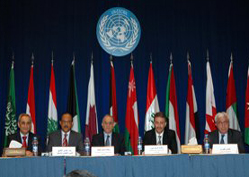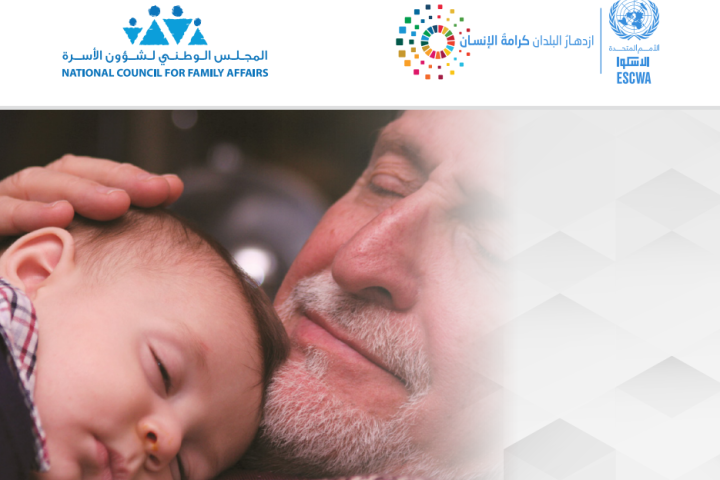For his part, the main speaker Elias Khoury considered that "the Nakba is an ongoing event, continuing for 61 years. It has not stopped for a single moment, though it took on many forms of wars and invasions." "Media uses a false word to speak of a two-state solution, when there is an Israeli State that was established in 1948, while the Palestinian State is non-existent," he said. Khoury added that "the people whose name was taken away, regained this name through words and sacrifices. It will not abandon its existence no matter how gloomy the scene looks today. If Israeli insists on rejecting the independence of Palestine, this means that it looks to establish an Apartheid regime, whose fate will not be much better than its South African counterpart's."
News
12 Mar 2009
ESCWA convenes on the International Day of Solidarity with the Palestinian People

meeting.jpg
ESCWA held an official ceremony on the occasion of the International Day of Solidarity with the Palestinian People (29 November), at the UN House, Beirut, with addresses focusing on solidarity through influential actions and the implementation of relevant UN resolutions.
The event was attended by prominent figures representing Lebanese leaders, a crowd of diplomats, cultural and economic figures and UN staff.
Speakers at the event were UN Under-Secretary General and ESCWA Executive Secretary Bader Al Dafa, Charge d'Affaires at the Executive Committee of the Palestinian Liberation Organization (PLO) in Lebanon, Ashraf Dabbour, and Lebanese novelist and literary critic, Elias Khoury.
AlDafa delivered the speech of UN Secretary-General Ban Ki-moon, which stressed on "the end of the occupation and (realizing) the goal of two States, Israel and Palestine, living side-by-side in peace and security (…) based on Security Council resolutions". "It is vital that a sovereign State of Palestine is achieved. This should be on the basis of the 1967 lines with agreed land swaps and a just and agreed solution to the refugee issue." In his statement, Ban considered that "Jerusalem should emerge as the capital of two States, with arrangements for the holy sites acceptable to all," voicing his deep concern that talks between Israel and the Palestine Liberation Organization have been suspended for almost a year. He reiterated his calls for the reunification of Gaza and the West Bank, requesting that Israel meet in full its Roadmap commitments and a durable resolution be found of the crisis in Gaza. "The international community continues to assist and protect the Palestinian people, including through the work of UN agencies, UNRWA foremost among them," he added. "The United Nations, for its part, will continue to work for a just and lasting peace in the Middle East through negotiations based on Security Council resolutions 242, 338, 1397, 1515 and 1850, previous agreements, the Madrid framework, the Road Map and the Arab Peace Initiative."
For his part, AlDafa examined the meaning, and form, of solidarity with the Palestinian people, saying that "whatever its form, and no matter how positive it is, solidarity is not a substitute for a solution. The latter is not far-fetched if there was an honest intention, firm will and solid conviction that no conflict is ever-lasting." The United Nations "offers assistance, through its many organizations, to the Palestinian people, government and civil institutions, with unrivaled persistence and dedication," he added, in an indication to the work of UNRWA Palestinian and International staff during the Gaza hostilities last year; people who presented a dignified and honorable image of the UN and the values and principles it stands for. AlDafa went on to say "However, we still feel that more can, and should, be done, to this people. I have a certainty that this feeling is not confined to the UN, but it goes beyond it to national, regional, and international institutions. The reason for this is that every day, this crisis takes on new angles, making it insufficient to deal with its secondary effects without a radical solution, which reveals its necessity every single minute of the day."
For his part, Dabbour underlined the importance and centrality of the Palestinian issue, and the importance of ending the long suffering of the Palestinian people. He commended the role of the UN in the life of the Palestinian people, saying that this organization "handled this issue ever since its inception so it could find a just solution to the tragedy of the century," adding that the UN has "worked throughout decades to preserve the rights of this people and protect them, lest they get lost. It was and continues to be, the main source of the legal and just basis towards a solution for the Palestinian issue." Dabbour reiterated the attachment of the Palestinian people to the right of return, backed by Resolution 164, and their rejection of resettlement, and called on the International community to stand up to its responsibilities and implement its resolutions. "We are heading to the UN and the Security Council, carrying the position of the Arab Peace Initiative Committee, to call for a resolution that reflects the positions of the various countries of the world that have asked for a two-state solution and an end to the Israeli occupation, which took place in 1967."



